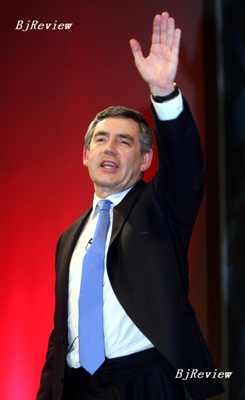
Gordon Brown has started his diplomatic road show. In making the rounds, the new British prime minister has to deal with his predecessor Tony Blair's unpopular diplomatic legacy such as Britain's support of the Iraq war. Brown has quickly turned his attention to bolstering relations with Britain's major allies.
During his first full month in office, Brown busied himself with relations with some of his country's biggest allies. Brown went to Germany for his first official foreign visit as prime minister on July 16, then to France. Several days later, the ongoing diplomatic tussle between Britain and Russia picked up steam, with the two countries dismissing each other's diplomats. Then in late July, Brown visited the United States for a meeting with U.S. President George W. Bush.
Brown's visits show that he "will stick to the traditional diplomacy of ‘three circles,' which is based on close relations with commonwealth nations, the United States and European countries," said Xing Hua, Director of Research Center of European Union with the China Institute of International Studies (CIIS).
Not only does Brown have to maintain diplomatic momentum with Britain's big political and economic ally, the United States, but also unlike his predecessor, he must strengthen Britain's ties with the EU. Because Russia never has been part of the "three circles," Brown must tackle heightened tensions with the country, and attain a balance power in Europe once again.
First, Germany and France
Right after he became prime minister, Brown visited Berlin and Paris in early July. Brown, German Chancellor Angela Merkel and French President Nicolas Sarkozy are expected to form a new EU leadership triangle.
"Britain will pay much more attention to the EU's development rather than to its alliance with the United States," Xing said.
Currently, the EU faces five major challenges that will affect diplomatic relations between the continent's three heavy hitters. First, the EU's integrity has been set back by the vetoed EU constitution draft. Second, the EU's future development lacks economic engine power. Third, the whole of Europe sees differences between "new Europe" and "old Europe," with the former preferring the U.S. shield on politics and security, while the latter relies on independent diplomatic, political and security policies. Fourth, the EU is threatened by Russia's growing tough attitude. And last, the United States is strengthening its influence in Europe, which recently caused a dispute with Russia over the antimissile defense system that the Americans plan to establish in Eastern Europe.
Under such circumstances, Britain will stick to its traditional policy of balancing power with Germany and France and pay more attention to its cooperation with the EU. During his Berlin visit, Brown said that he would urge Britain's Parliament to approve the new EU treaty that creates a President of Europe and a single legal identity for the bloc, as soon as possible. Britain views the new treaty as a de facto constitution for the EU. The country's approval of the treaty would be a signal to the EU that Britain seeks to establish closer relations with Germany and France. If the new Britain-France-Germany alliance is established, the whole EU will be more united and a new balance of power between EU and the United States will emerge.
Tit-for-tat diplomacy
London and Moscow's diplomatic brawl was triggered in mid-July when Russian officials refused to extradite Andrei Lugovoi, the prime suspect in the poisoning case of former KGB agent Alexander Litvinenko, a Russian-born British citizen. Lugovoi, also a former KGB officer, was accused of murdering Litvinenko by contaminating his tea with the radioactive isotope polonium-210.
British Foreign Secretary David Miliband said on July 16 that Britain would expel four diplomats from the Russian Embassy in London because Moscow refused to comply with the extradition request. In its defense, Russia cited its constitutional ban on turning citizens over to other nations as well as a European convention that lets signatories refuse to extradite their citizens. As a payback, Russia expelled four British diplomats.
Xing from the CIIS pointed out that the expulsions of diplomats by the two countries had not been uncommon after World War II.
"Actually, the whole extradition thing was only the last straw," he said, adding that the current tense situation was caused by the hard-line diplomatic policies of both sides.
But having survived the disintegration of the Soviet Union in 1991 and the financial crisis in August 1998, Russia feels that now is the time to step out of fallow ground and re-emerge as a
| 